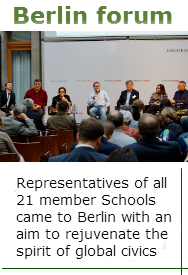Current events
Here are the most significant talks of the seminar from the view point of the participants of the Moscow School.
“Modernisation is not a goal, it is a process”
 One of the most expected participants, Mr. Evgeny Gontmakher, Management Board Member of the Institute of Contemporary Development and Deputy director of the Institute of World Economy and International Relations (IMEMO) draw up a balance sheet of the project entitled “the state’s modernisation”.
One of the most expected participants, Mr. Evgeny Gontmakher, Management Board Member of the Institute of Contemporary Development and Deputy director of the Institute of World Economy and International Relations (IMEMO) draw up a balance sheet of the project entitled “the state’s modernisation”.
The modernisation process is necessary to any contemporary state as it is evaluated according to the living standards, the market economy’s effectivness and the level of development and democracy. According to Mr. Gontmakher, at the current stage of its development, Russia is not following the path of modernisation: “How can we talk about modernisation when Russia’s economic growth for the year 2010 only represented 4% ? At this speed of growth, it will not be possible to catch up with european developed countries in terms of GDP before 25 years.” The unfavourable investment climate contributes to this low level of development, despite the fact that leaders continuously recall the importance of investments in the economy.
Gradually, Russia has entered a stage of deterioration; the “vertical power”, engaged during Putin’s presidency to the detriment of democratic liberties, does not even work.
Modernisation requests a good leadership, but in Russia this does not exist. What is the reason behind this? According to Evgueny Gontmakher the reason is that the majority of the population including the oil and energy company representants do not really care: “in our country the people are opposed to any change, on principle. Nobody tries to motivate the society to start with the modernisation process; it seems that only Dmitri Medvedev wishes it. The “collective well-being” atmosphere that is on every main chanel, contributes to create a nice picture in people’s mind but does absolutely not reflect reality. In this way modernisation processes are absent today in Russia and its perspectives are neither clear nor predictable”. A suitable evaluation of the situation from the elite is necessary, according to Mr. Gontmakher.
Russia, Europe and its « close neighbourhood »: do we have to expect a growing distance between East and West?
 Marie Mendras, Professor at the London School of Economics and Political Science and at the Political science Institute in Paris expressed her opinion on Russia’s policy regarding its relationship with its neighbouring countries. According to the French political commentator, the European Union’s neighbourhood policy and the Eastern Partnership represent an important obstacle between Russia and the EU.
Marie Mendras, Professor at the London School of Economics and Political Science and at the Political science Institute in Paris expressed her opinion on Russia’s policy regarding its relationship with its neighbouring countries. According to the French political commentator, the European Union’s neighbourhood policy and the Eastern Partnership represent an important obstacle between Russia and the EU.
While mentionning the six countries targeted by the Eastern Partnership – Armenia, Georgia, Moldova, Ukraine, Belarus and Azerbaïdjan – Marie Mandras noted that changes in theses countries are hard to implement because of their neighbourhood to Russia and to the European Union. They have by the way different development rates. If the countries in question turn their development in the direction of Europe, they will have difficulties with Russia, but if on the contrary they choose “friendship” with their “big brother”, they will complicate their relationship with Europe.
According to Marie Mandras, none of these political regimes is sufficiently balanced and consolidated. Even the existence of democratic institutions is a problem. These six countries are in the middle of an important transition between the sovietic past and the future that they still struggle to foresee. They have no established strategy, nor any clear vision on how to move forward and construct their foreign policy.
In her conclusion, Marie Mandras mentionned the lack of understanding of “old Europe” countries about Russian politics. This can be explained according to her by the different ways of thinking: the word “security” for example, is not understood in the same way. For Europe, “security” first means the security of its citizens and the challenge consists in elaborating policies that aim to protect them. According to the French political commentator, despite the fact that Europe’s values are nowadays in crisis, the fundamental principle of the European Union is and has always been the rule of law. In this way, there will not be any separation between Russia and western Europe but mutual understanding remains however hard to implement.
Will new media affect representative democracy?
 Among the numerous topics addressed during the seminar, a part has been dedicated to the question of the new media and democracy. Pilar Bonet, correspondent at the newspaper “El pais” addressed the question of transparency and information in our societies, relevant and painful topic, especially in Russia.
Among the numerous topics addressed during the seminar, a part has been dedicated to the question of the new media and democracy. Pilar Bonet, correspondent at the newspaper “El pais” addressed the question of transparency and information in our societies, relevant and painful topic, especially in Russia.
Pilar Bonet shared her experience on WikiLeaks with the participants. Urgently called in Madrid, following Julian Assange’s phone call to the Chief Editor from “El Pais”, she started the perusal of the documents that WikiLeaks was in possession of. The objective was to identify five topics concerning Russia and its leaders.
During the Seminar, Ms Pilar wanted above all to share the conclusions to be drawn of her experience:
- The only secret that is entirely protected is the one that is well hidden in our head;
- Politicians do not protect us, consequently we have to oblige them to work ;
- It is necessary to favour the divulgation of these documents like the ones concerning the enquiries fo Alexei Navalny on the embezzlement within « Transneft ».
- Discussions on the concept of « secret » should be encouraged as it is a very useful cover for the civil servants who don’t do anything.
As for the citizens, they have to fight for the free access to information; the society should be more demanding. The WikiLeaks experience can only be beneficial. And like a “social boost”, this kind of structure is necessary.
 The case WikiLeaks has also been addressed by Mr. Michael Mertes, a German journalist. Today, Mr. Mertes judges with caution the contribution of new technologies, -Internet in particular - to the political development in the world. “Sensationalism” of the called “WikiLeaks revolution” and the recent events in the Arab world, when the citizen’s mobilisation organises itself through Facebook or Twitter is indeniable. New technologies have a considerable influence on communication between citizens, the States and the NGOs, on the media’s content and on dissemination means. But the phenomenon like “Revolution Twitter” for example, also has a dark side.
The case WikiLeaks has also been addressed by Mr. Michael Mertes, a German journalist. Today, Mr. Mertes judges with caution the contribution of new technologies, -Internet in particular - to the political development in the world. “Sensationalism” of the called “WikiLeaks revolution” and the recent events in the Arab world, when the citizen’s mobilisation organises itself through Facebook or Twitter is indeniable. New technologies have a considerable influence on communication between citizens, the States and the NGOs, on the media’s content and on dissemination means. But the phenomenon like “Revolution Twitter” for example, also has a dark side.
Refering to the book « The World is flat » from Thomas Friedman, columnist at the New York Times, the German expert warns: “ the excessive faith in the miraculous power of the Internet can lead to a “flattening” of numerous phenomenon and important processes to a democratic society. Journalism becomes “flat”, when journalists simply prefer to copy-paste in their articles, the brief news item of Livejournal or Tweets instead of trying to compare their information. On the Internet, the political discourse is also flattening and is often reduced to rumours.
According to Michael Mertes, the key of sustainable development of modern democracies lies in the appropriate use of new techniques and technologies, while keeping the fundamental ideas. Even though there are many possibilities, the web’s widening hides many threats: the coming back of Big Brother in the form of Internet service provider (ISP) which collects and processes with personal information; the emergence by the government of new means of concealing important data for the society; the massive dissemination of data prohibited by law, etc. The clever use of new technologies by the citizens, who believe in the necessity of democratic institutions, can be a huge step for humanity.
For more information on the seminar’s programme and the experts invited, please consult the website of the Moscow School of Political Studies.








